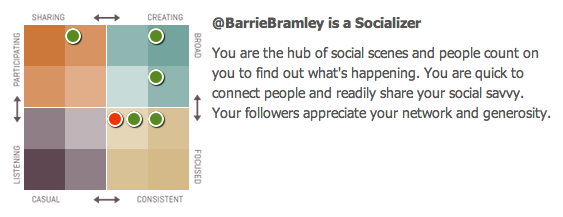I mainly use two online apps to run the Twitter accounts I run. And I use these two because they do very different things. There are some things I need to do from time to time where the one trumps the other, and visa versa for other things. So there’s no getting rid of either of them.
Anyway, a possibly meaningless introduction to Klout. It’s integrated into CoTweet, but you can get there without CoTweet (click here).
The Klout Score is the measurement of your overall online influence. The scores range from 0 to 100 with higher scores representing a wider and stronger sphere of influence. Klout uses over 25 variables to measure True Reach, Amplification Probability, and Network Score. The size of the sphere is calculated by measuring True Reach (engaged followers and friends vs. spam bots, dead accounts, etc.). Amplification Probability is the likelihood that messages will generate retweets or spark a conversation. If the user’s engaged followers are highly influential, they’ll have a high Network Score.
We believe that influence is the ability to drive people to action — “action” might be defined as a reply, a retweet or clicking on a link. We perform significant testing to ensure that the average click-through rate on links shared is highly correlated with a person’s Klout Score. The 25+ variables used to generate scores for each of these categories are normalized across the whole data set and run through our analytics engine. After the first pass of analytics, we apply a specific weight to each data point. We then run the factors through our machine-learning analysis and calculate the final Klout Score. The final Klout Score is a representation of how successful a person is at engaging their audience and how big of an impact their messages have on people.
I’ve enjoyed engaging with their system of measurement, simply because it goes beyond the usual measure of ‘how many followers’ I have? A friend, for example, who has three times as many followers on Twitter than I do, but our Klout Scores suggest I behave in a very different way to how he does, and because of that, according to Klout, I get a higher score.

Sometimes I smile when I look at what Klout feedbacks to me, because it sounds a little like a personality assessment based on my Twitter behaviour. Very flattering and all mushy and gooey. Who knows, perhaps this will even be a significant measure of who we are in the future. Can it be any less accurate or definitive than some of the measures we use today? Maybe even an extra layer to be applied to the Talent Matrix being implemented inside of companies the world over? At least the feedback is objective, instant, and I know exactly what’s expected of me to move it : ) But this is a conversation for another day…



Barrie, I just discovered that your Klout scores don’t get regularly updated. You can force a refresh of your score by going to Klout.com, logging in and then getting a score refresh.
I wondered why mine hadn’t move in some time. Just discovered that the last time my score was calculated was four months ago. Refresh underway…
Thank you sir for the lesson and reminder.
I re-freshed mine, and while I’m convinced I’m ‘growing’ on Twitter, Klout has my new score as lower than it was.
So again, perhaps this is a really good measure for how you’re REALLY doing on Twitter. Certainly goes ‘beyond the hype’ of just having followers?
Thanks for your article. I figured Klout would update automatically and was a little annoyed that my influence had not grown at all for several months (on Twitter Grader I’ve been going up and up). When I noticed the people Klout claimed were influencing me included somebody I stopped following several months ago (for tweeting too much about what she had for breakfast) and supposedly nobody had EVER retweeted me, I knew something was wrong. Fortunately, I found your article… and Klout’s refresh button!!!
…. Or I should say I found Graeme Codrington’s comment!!!